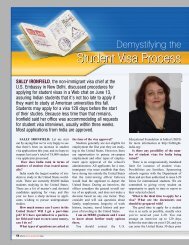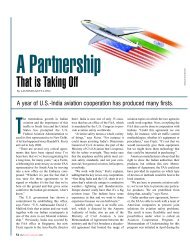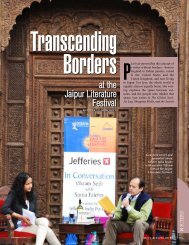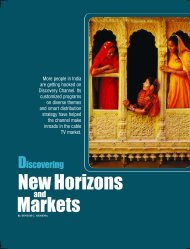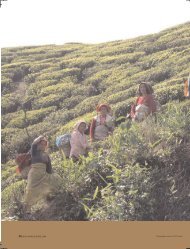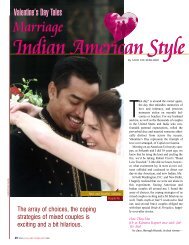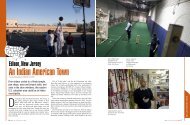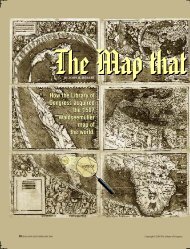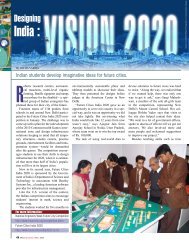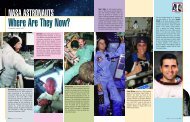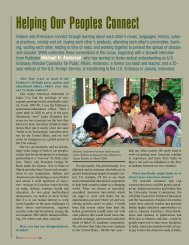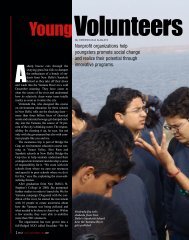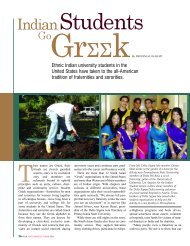Indian Student Leaders Learn About America First-Hand, SPAN ...
Indian Student Leaders Learn About America First-Hand, SPAN ...
Indian Student Leaders Learn About America First-Hand, SPAN ...
Create successful ePaper yourself
Turn your PDF publications into a flip-book with our unique Google optimized e-Paper software.
Excitement of the Unknown<br />
<strong>Indian</strong> <strong>Student</strong> <strong>Leaders</strong> <strong>Learn</strong><br />
<strong>About</strong> <strong>America</strong> <strong>First</strong>-<strong>Hand</strong><br />
By CAITLIN FENNERTY<br />
Six confident and poised <strong>Indian</strong> university<br />
students, aged 20 and 21,<br />
walked into a conference room at the<br />
<strong>America</strong>n Center in New Delhi in<br />
July. Each took a seat behind a stack<br />
of books, including a world almanac, an<br />
outline of U.S. history, another on <strong>America</strong>n<br />
geography. They had reason to be confident.<br />
Each had been nominated by their<br />
university for demonstrating leadership on<br />
campus and off. And they were on their way<br />
to becoming representatives of their country.<br />
Sixty students from across India had<br />
written essays on leadership and engaged<br />
in a panel discussion on democracy. These<br />
six were the ones chosen by the U.S.<br />
Embassy for the two-month Study of<br />
United States Institutes for <strong>Student</strong><br />
<strong>Leaders</strong> program this fall. <strong>Indian</strong>,<br />
Bangladeshi and Pakistani undergraduates<br />
are placed in intensive academic programs<br />
to give them a deeper understanding<br />
of the United States and to develop<br />
their leadership skills.<br />
Despite their confidence, the students<br />
were nervous and excited, too. None had<br />
ever been to the United States. And five of<br />
them were receiving a passport for the<br />
first time.<br />
Samridhi Shukla from Delhi University,<br />
a young woman with long, dark hair and<br />
sunglasses on her head, was elated over<br />
the prospect of regular trips to KFC and<br />
meeting new <strong>America</strong>n friends at the<br />
University of Alabama in Huntsville.<br />
Eisha Aleem from Jamia Millia Islamia,<br />
wearing a pink salwar kameez and head<br />
For more information:<br />
Bureau of Educational and Cultural Affairs<br />
http://exchanges.state.gov/<br />
The University of Alabama in Huntsville<br />
http://www.uah.edu/<br />
Green River Community College<br />
http://www.greenriver.edu/<br />
10 <strong>SPAN</strong> SEPTEMBER/OCTOBER 2009<br />
scarf, spoke excitedly about the experiences<br />
that her older sister, Hiba, had with<br />
the program at Washington College in<br />
Maryland in 2004. Hiba was also on hand<br />
to share tips and insights with the other students.<br />
Raghav Bhatt, a quiet but selfassured<br />
young man from Lucknow<br />
University, said he was psyched to fly half<br />
way around the world. Shubhda Chaudhary,<br />
a smiley young woman with hazel eyes,<br />
couldn’t wait to meet the host family she<br />
would be staying with.<br />
All agreed that first and foremost they<br />
wanted to be good ambassadors. In Eisha<br />
Aleem’s words, this means “showing a<br />
true picture of India.” Bhatt said that, like<br />
many <strong>America</strong>ns, <strong>Indian</strong>s view themselves<br />
as part of a large salad bowl; one country<br />
composed of very diverse cultures and<br />
peoples. So whether they are Muslim or<br />
Hindu, a Kashmiri or Delhiite, they wanted<br />
to convey to <strong>America</strong>ns the richness of<br />
India’s diverse culture, traditions, values<br />
and religions. It is not an easy task, they<br />
admit, but an important one. “When groups<br />
of people are unaware of one another,<br />
when they see things in a shallow or onedimensional<br />
way, things get dirty and prejudiced<br />
assessments on both sides are likely<br />
to be made,” says Eisha Aleem. Rizwan<br />
Javeed Sheikh believes he has a threefold<br />
duty: to represent his state, Jammu and<br />
Kashmir, his country, and his religion,<br />
Islam. Naveed Iqbal, like Sheikh, attends<br />
Kashmir University. “As a Kashmiri and a<br />
Muslim I am just as die-hard an <strong>Indian</strong> as<br />
anyone else. I love my country,” she says.<br />
The students are equally eager to learn<br />
more about <strong>America</strong>n culture and expect<br />
this to be a huge eye-opener. “It will be a<br />
whole new experience,” says Iqbal, who<br />
is attending the University of Alabama in<br />
the <strong>America</strong>n South with Shukla and<br />
Eisha Aleem. “We can’t wait to drink it all<br />
in!” The other three are at Green River<br />
Community College in Washington, in the<br />
Northwest.<br />
Rashee Mehra, who attended Green<br />
River College last summer, was on hand to<br />
tell them how valuable experiences both<br />
inside and outside the classroom are to<br />
getting a deeper insight into <strong>America</strong>n culture<br />
and values. “It was such an opportunity<br />
to learn from the <strong>America</strong>n perspective<br />
about the political, social and economic<br />
issues and changes that have shaped life in<br />
the U.S.,” Mehra says. “I think it...helped<br />
me respect and understand the culture.<br />
Staying with a host parent was also wonderful.<br />
We became so close that my host<br />
mother came to visit me here in India. You<br />
make such close bonds with people.”<br />
Those studying in Washington are living<br />
with host families and those in Alabama<br />
are in dormitories with other students.<br />
Although they weren’t entirely sure<br />
what to expect, the students had a few preconceived<br />
notions about <strong>America</strong>ns. Bhatt<br />
had heard that <strong>America</strong>ns are typically<br />
friendly and informal and apart from professional<br />
or academic settings, introduce<br />
themselves by their first names. The informal<br />
bit worries him a little. “Are we supposed<br />
to call our host parents by their first<br />
names? In Hindi we have special words to<br />
denote status and respect. I don’t know if<br />
I could get used to calling adults by their<br />
first names. Do you think they’ll mind if I<br />
stick to Mr. and Mrs.?”<br />
Shukla appreciates the value <strong>America</strong>ns<br />
place on individuality. She likes the fact<br />
that they “seem to feel free to speak their<br />
minds on most subjects. I think it will create<br />
a more interesting learning environment<br />
when students are outspoken and are<br />
frank in expressing their opinions.”<br />
At the U.S. universities, the visiting students<br />
are engaging in seminar discussions<br />
and they are assigned readings, group presentations<br />
and lecture attendance. The<br />
coursework and classroom activities are<br />
aimed at helping them explore the princi-
Courtesy Raghav Bhatt<br />
Top: Raghav Bhatt (back row from left),<br />
Rizwan Javeed Sheikh and Shubhda<br />
Chaudhary with other program<br />
participants in front of Hurricane Ridge<br />
in Olympic National Park in<br />
Washington state.<br />
Above from left: Samridhi Shukla,<br />
Naveed Iqbal, Jasmeet Khurana and<br />
Eisha Aleem visiting a synagogue in<br />
Huntsville, Alabama.<br />
ples of democracy and fundamental<br />
<strong>America</strong>n values such as individual rights,<br />
freedom of expression, pluralism, tolerance<br />
and volunteerism.<br />
Hiba Aleem, who participated in the<br />
program five years ago, is pursuing a<br />
Ph.D. in English literature and plans to go<br />
into education. She was very impressed<br />
by the informal, discussion based aspect<br />
Courtesy Eisha Aleem<br />
of the <strong>America</strong>n classroom, “I liked that<br />
the teachers listened to the students. We<br />
were encouraged to express our opinions<br />
and it was okay if we disagreed with the<br />
teacher. As a result, my professors were<br />
very approachable, the discussions were<br />
deeper and more enriching and I felt I<br />
could take charge of my own education.”<br />
While Mehra found the <strong>America</strong>n<br />
classroom less rigorous than the <strong>Indian</strong>,<br />
she was impressed by the emphasis on<br />
volunteerism. “I think that is a fantastic<br />
thing. I think volunteerism is so important<br />
for personal development and creates a<br />
better, cleaner, healthier society.” She herself<br />
is working for an NGO called<br />
Swechha. Its mission is to draw attention<br />
to New Delhi’s growing environmental<br />
problems.<br />
Mehra excited the group with stories<br />
of her own experiences: “We played<br />
Bollywood songs for our teachers on<br />
YouTube and they absolutely loved it! We<br />
also got them excited about cricket. We<br />
talked about it so much that the teachers<br />
told us they wanted to play in a cricket<br />
match with us. That was great. Since<br />
we’ve left, Green River Community<br />
College has set up a cricket team. We definitely<br />
left our mark.”<br />
Shukla, who did another exchange program<br />
last summer, adds that as much as you<br />
leave a mark on others, a mark will be left<br />
on you, too. While living with her host family,<br />
she was forced to face ways of life and<br />
thinking that were very different from her<br />
own. She feels this was a positive thing and<br />
is excited to challenge herself again. “You<br />
know I stayed with a family that was very<br />
different from my own. At first I wondered<br />
what I had gotten myself into, but then, you<br />
know, I saw that they were good people.<br />
They are now close friends of mine. You<br />
can’t be content with what you know. You<br />
need to challenge yourself, your ideas,<br />
make an effort, so you can grow.”<br />
Caitlin Fennerty is a student at St. John’s<br />
College in Annapolis, Maryland. She wrote<br />
this article while working as an intern for the<br />
U.S. Embassy in New Delhi. EXCHANGES<br />
<strong>SPAN</strong> SEPTEMBER/OCTOBER 2009 11




